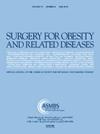Observations of Ramadan fasting in the initial year after bariatric surgery
IF 3.5
3区 医学
Q1 SURGERY
引用次数: 0
Abstract
Background
Ramadan is considered to be the holiest month of the Islamic religion. Hundreds of millions of Muslims practice the commitments of Ramadan, which include the abstinence from eating and drinking during daylight hours. Although there are exemptions to fasting for medical reasons, there is very limited guidance in terms of the safety of fasting in the postoperative period after bariatric surgery.
Objectives
To assess outcomes and impact of fasting on patients who underwent bariatric surgery within the year leading up to Ramadan 2023.
Setting
Community hospital health system.
Methods
Retrospective review of medical records and direct patient contact for 376 study participants.
Results
Of the 376 participants who underwent bariatric surgery in the year before Ramadan, only 8 patients (2.1%) reported they did not intend to fast during Ramadan. Patients who ended up having to break fasting were closer to their surgery date, at 4.3 months from surgery, than patients who were able to fast for the entire month of Ramadan, who were 5.1 months out from surgery. There was no difference between the number of patients needing to break fasting on the basis of what type of bariatric surgery they had performed. The number of patients needing to go to the emergency department and receive intravenous fluids was small, at 11 patients (2.9%), and these patients were also closer to surgery than those not needing to go to the emergency department or receive intravenous fluids. Side effects experienced during Ramadan, including abdominal pain, nausea/vomiting, and hypoglycemia, were more common in patients that were closer to their surgery, notably within 4 months of their surgery date. Patients who lost weight during Ramadan were closer to their surgery date at 4.9 months from surgery compared with those who maintained or gained weight, who were 7.0 months out from surgery.
Conclusions
There are a limited number of studies examining the safety and patient outcomes in those who fast for religious purposes after bariatric surgery. In this study, 376 participants who were within 1 year of undergoing surgery were followed throughout the month of Ramadan. Patients closer to surgery were more likely to break fasting, present to the emergency department, and experience side effects. However, the overall rate of complications was low, suggesting that fasting in the setting of a religious tradition in the carefully chosen patient with counseling and supervision may be a safe option.
"减肥手术后第一年的斋月禁食观察"
斋月被认为是伊斯兰教中最神圣的月份。数亿穆斯林践行斋月的承诺,其中包括白天不吃不喝。虽然出于医疗原因的禁食有豁免,但在减肥手术后禁食的安全性方面,指导非常有限。目的评估在2023年斋月前一年内接受减肥手术的患者禁食的结果和影响。社区医院卫生系统。方法回顾性分析376名研究参与者的医疗记录和患者的直接接触。结果在斋月前一年接受减肥手术的376名参与者中,只有8名患者(2.1%)报告他们不打算在斋月期间禁食。最终不得不打破禁食的患者比那些能够在整个斋月禁食的患者(手术后5.1个月)更接近手术日期(手术后4.3个月)。不同类型的减肥手术患者需要断食的数量没有差别。需要去急诊科接受静脉输液的患者数量较少,为11例(2.9%),这些患者也比不需要去急诊科或接受静脉输液的患者更接近手术。斋月期间出现的副作用,包括腹痛、恶心/呕吐和低血糖,在接近手术的患者中更为常见,尤其是在手术日期后4个月内。在斋月期间减肥的患者在手术后4.9个月更接近手术日期,而体重保持或增加的患者在手术后7.0个月更接近手术日期。结论:在减肥手术后为宗教目的禁食的患者的安全性和结果的研究数量有限。在这项研究中,376名接受手术一年内的参与者在整个斋月期间被跟踪。接近手术的患者更有可能打破禁食,出现在急诊科,并经历副作用。然而,并发症的总体发生率很低,这表明在宗教传统的背景下,在精心挑选的病人中进行禁食,并进行咨询和监督,可能是一个安全的选择。
本文章由计算机程序翻译,如有差异,请以英文原文为准。
求助全文
约1分钟内获得全文
求助全文
来源期刊
CiteScore
6.70
自引率
12.90%
发文量
570
审稿时长
56 days
期刊介绍:
Surgery for Obesity and Related Diseases (SOARD), The Official Journal of the American Society for Metabolic and Bariatric Surgery (ASMBS) and the Brazilian Society for Bariatric Surgery, is an international journal devoted to the publication of peer-reviewed manuscripts of the highest quality with objective data regarding techniques for the treatment of severe obesity. Articles document the effects of surgically induced weight loss on obesity physiological, psychiatric and social co-morbidities.

 求助内容:
求助内容: 应助结果提醒方式:
应助结果提醒方式:


